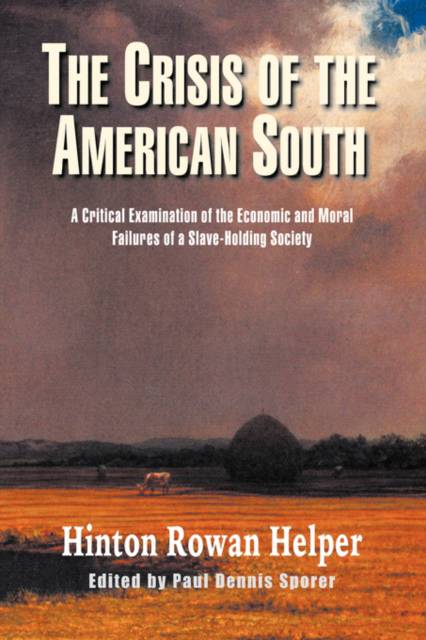
Je cadeautjes zeker op tijd in huis hebben voor de feestdagen? Kom langs in onze winkels en vind het perfecte geschenk!
- Afhalen na 1 uur in een winkel met voorraad
- Gratis thuislevering in België vanaf € 30
- Ruim aanbod met 7 miljoen producten
Je cadeautjes zeker op tijd in huis hebben voor de feestdagen? Kom langs in onze winkels en vind het perfecte geschenk!
- Afhalen na 1 uur in een winkel met voorraad
- Gratis thuislevering in België vanaf € 30
- Ruim aanbod met 7 miljoen producten
Zoeken
The Crisis of the American South
A Critical Examination of the Economic and Moral Failures of a Slave-Holding Society
Hinton Rowan Helper
Hardcover | Engels
€ 58,95
+ 117 punten
Omschrijving
Although Harriet Beecher Stowe's Uncle Tom's Cabin is considered to be the book that most motivated a nation against slavery, it was not a work of fiction, but rather a sociological treatise that perhaps should take that honor. Hinton Rowan Helper, a slaveholder's son, wrote a well-researched and persuasive indictment of slavery, which not only became widely known but also had a major impact on American politics. In fact, it was instrumental in helping Abraham Lincoln win the Presidential election of 1860. However, this work, The Crisis of the American South, is complex, and it would be a mistake to look at it solely as anti-slavery propaganda. Helper, as other authors, argued that the basic injustices within the institution of slavery were a heinous offence against Christian principles. Yet, he went much further than others to document the harm that was actually being done to society by this institution. For example, Helper claimed that slavery was keeping the South backwards agriculturally and industrially, that it was destroying land prices, and hindering railroad building. In addition, he brought much needed attention to key cultural aspects that were usually ignored, such as the dependence of Southerners on the products of Northern industry, a lack of patriotism amongst the Southern elite, and the inability of the illiterate poor whites of the South to express their desires and aims. It is clear from his writing, that although Helper was sympathetic to the plight of blacks, he empathized most with the downtrodden whites of the South. Ultimately, Helper's larger goal was to provoke a type of socialist revolution, and the emancipation of slaves was only one aspect of this. Hinotn Rowan Helper (1829-1909) was born and raised in North Carolina, his father dying only a year after his birth. His family owned a few slaves, working them on a small farm. After a wasted three years in California during the "gold rush", he apparently contemplated a work that would address the economic problems in his own part of the country, the South. After much difficulty in publishing this book, Helper eventually achieved great success and popularity. He went on to live in South America, being appointed by President Lincoln as U.S. consul to Buenos Aires. Although respected as a scholar for his landmark anti-slavery work, his later writings became strident and polemical. Through various publications, he warned Americans about the threat that blacks and other non-white races posed for American society. His erstwhile supporters came to regard his post-war views with distaste, and they could not allow themselves to be associated with his program of nativism. Paul Dennis Sporer has edited many other works that contribute to the understanding of American society, such as End of an Era, by John Sergeant Wise, Is Secession Treason? by Albert Bledsoe, Newer Ideals of Peace, by Jane Addams, and Half a Century, by Jane Swisshelm.
Specificaties
Betrokkenen
- Auteur(s):
- Uitgeverij:
Inhoud
- Aantal bladzijden:
- 368
- Taal:
- Engels
Eigenschappen
- Productcode (EAN):
- 9781932490367
- Verschijningsdatum:
- 1/04/2007
- Uitvoering:
- Hardcover
- Formaat:
- Genaaid
- Afmetingen:
- 152 mm x 229 mm
- Gewicht:
- 693 g

Alleen bij Standaard Boekhandel
+ 117 punten op je klantenkaart van Standaard Boekhandel
Beoordelingen
We publiceren alleen reviews die voldoen aan de voorwaarden voor reviews. Bekijk onze voorwaarden voor reviews.









